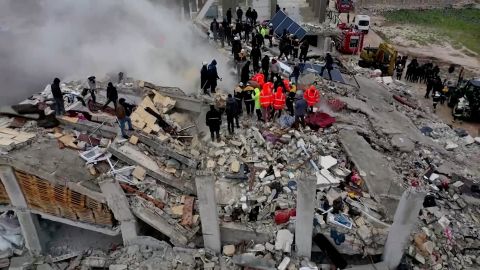[ad_1]
CNN
—
A massive international rescue effort is underway in Turkey and Syria to reach victims trapped within rubble as survivors endured their first night in freezing conditions beside the crumbled remains of thousands of homes and buildings.
The death toll continues to climb more than 24 hours after the quake as search terms navigate blocked roads and damaged infrastructure to reach the affected area, which has been rattled by at least 100 aftershocks.
More than 4,300 people were killed either side of the Turkey-Syria border when the 7.8-magnitude quake hit southern Turkey in the early hours of Monday.
But with thousands more injured and an unknown number missing, it’s feared the final toll could be much higher.
Here’s what we know:
In Turkey, at least 2,921 people have died and several thousand are injured, the head of the country’s disaster services, Yunus Sezer told a news conference Monday night.
The weather and the scale of the disaster were making it challenging for aid teams to reach the affected area, Turkish Health Minister Fahrettin Koca said, adding that helicopters were unable to take off on Monday due to the poor weather.
Heavy snowstorms have recently hit parts of Syria and Turkey, according to CNN meteorologist Haley Brink, and by Wednesday already cold temperatures are expected to plummet several degrees below zero.
Photos taken in earthquake-hit cities in southeastern Turkey show families huddling around fires to keep warm. Some sought shelter in buses, sports centers, mosques and underneath temporary tarpaulin tents – structures sturdy enough to withstand further aftershocks or flimsy enough not to cause severe injury should they collapse.
At least 5,606 structures crumbled during the quake and in the hours after, Turkey’s Disaster and Emergency Management Agency (AFAD) said. Iskenderun State Hospital in the city of the same name was among them, Koca, the health minister said.
“We are trying to save the medical workers and patients there,” he added. “These sorts of disasters can only be overcome with solidarity.”
By late Monday, at least 300,000 blankets, 24,712 beds, and 19,722 tents had been sent to the quake-affected areas, AFAD said.
In neighboring Syria, a country already suffering the effects of civil war, the devastation is widespread. At least 1,136 people were killed in the quake, state news agencies reported, with fears more remain buried within rubble.
Much of northwestern Syria, which borders Turkey, is controlled by anti-government forces, and aid agencies warn of an acute humanitarian crisis that is likely to be felt for months to come.
El-Mostafa Benlamlih, the United Nation’s Humanitarian Coordinator in Syria, El-Mostafa Benlamlih, told CNN the search and rescue mission was being hampered by the lack of heavy equipment and machinery.
He said the UN’s supply of stock has been distributed and more medicine and medical equipment is needed, and especially fresh water or tools to repair damaged water tanks.
In photos: Deadly quake strikes Turkey and Syria
“Most of the communities depend on elevated tanks of water. Most of these elevated tanks of water were the first ones to fall, or to fall into disrepair. They need replacements or they need repair. We need all of this,” he said.
Around four million people in northern Syria were already displaced and relying on humanitarian support as a result of war, according to James Elder, spokesman for UNICEF, the United Nations Children’s Fund. This winter had been particularly tough due to the freezing conditions and a cholera outbreak.
“Everyone is overstretched in that part of the world … there is an enormous amount do,” he said. “People have fled their homes often standing around in bitterly cold conditions really without access to safe water. So water is key. Blankets, food, psychological support.”

Hospitals in the country are overwhelmed as victims seek help, with some facilities damaged by the quake. And there is particular concern for about the spread of illness, especially among children, who were already living in extreme hardship.
A volunteer with the “White Helmets” group, officially known as the Syria Civil Defense, said the organization does not have enough help to handle this disaster.
“Our teams are working around the clock to help to save the injured people. But our capabilities, our powers are not enough to handle this disaster. This disaster is bigger than any organization in northwest Syria,” Ismail Alabdullah told CNN. “This disaster needs international efforts to handle.”
[ad_2]
Source link




